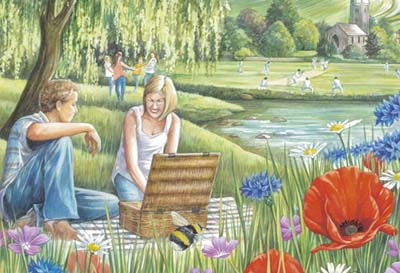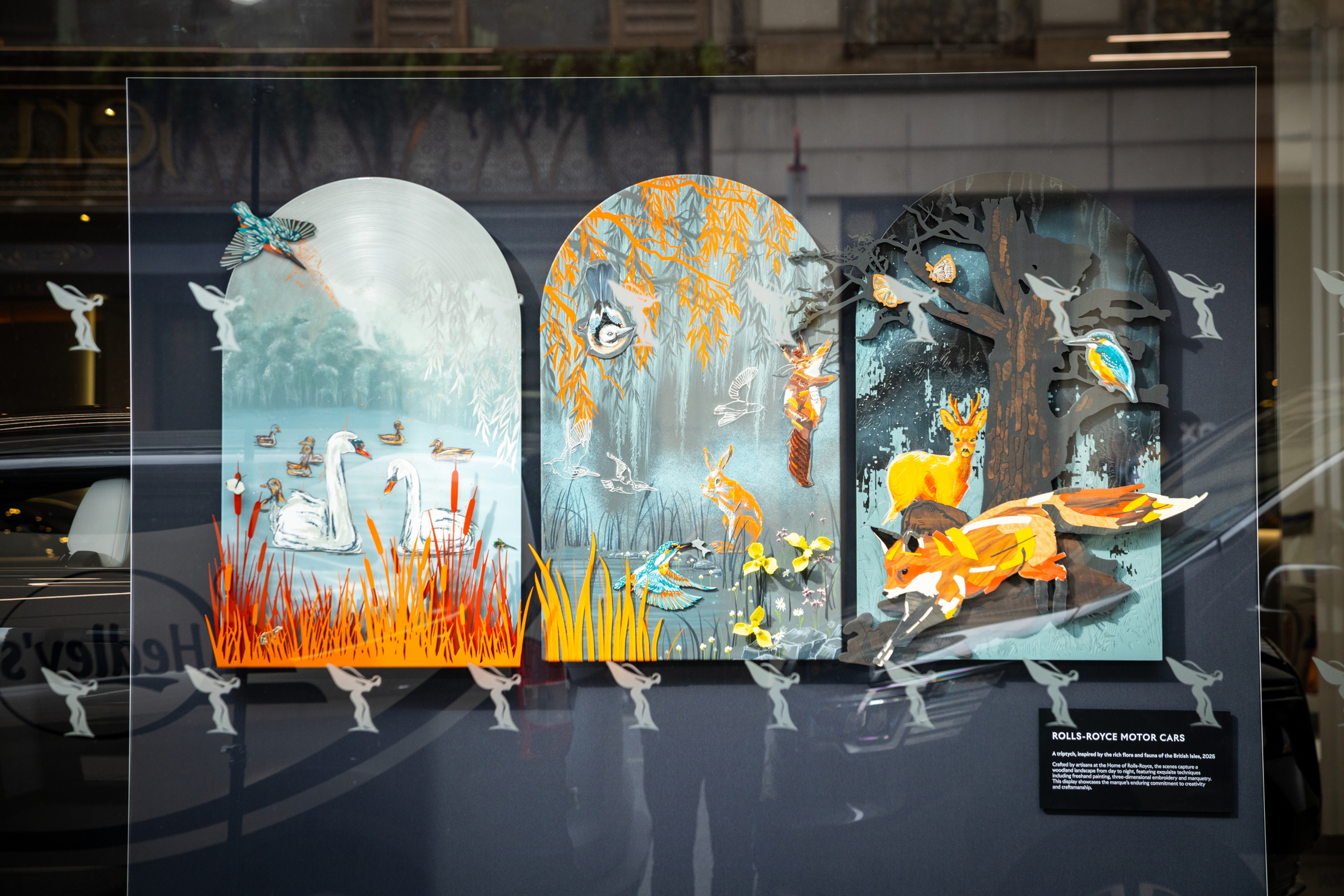Listen to summer
Of all the senses, the sounds of summer are the most evocative, says Jonathan Self


The gentle murmur of bees, the soft cooing of pigeons, the distant thwack of willow striking leather, the cool clink of ice dropping into a glass tumbler, the almost imperceptible rustle of leaves stirred by a warm breeze, the musical splashing of water in a fountain, even the plaintive cry of ‘Are we there yet?' from a child in the back seat-these, and any one of thousands of other very particular sounds, are all it takes to evoke the idea of a perfect British summer. They speak to us of such delights as lazy afternoons in deckchairs, expeditions to the beach, cricket on the village green and picnics in lush, scented gardens.
Each of our senses is capable of conjuring up associations and memories, but we seem to pay more attention to some than to others. Proust, for example, wrote 4,215 pages about his life after tasting a small, freshly baked sponge cake (although, of course, this may be partly explained by the fact that he was French) and heaven only knows how many thousands of poems have been inspired by the scent of flowers or paintings by the sight of a mountain sunset.
When it comes to sound, however, it could be argued that, in terms of the pleasure it can bring us, this is the forgotten sense. Historically, when hearing has been written about in relation to the other senses, it has rarely ranked first. Gellius placed it second, after sight, as did Chaucer: ‘Thy fyve wittes, that been sighte, herynge, smellynge, tastynge or savourynge, and feelynge.' However, in the Cursor Mundi (an anonymous 14th-century poem), it did manage to win first place: ‘Hering, sight, smelling and fele, cheuing er wittes five. All sal be tint er sal pas, quen þe hert sal riue.'
Its practical uses are twofold: communication and warning. Yet, although the slightest of noises may be capable of engendering enormous emotion-the quiet breathing of a baby asleep on a rug under a tree, for example, or (for passionate fishermen) the quick splash of a salmon leaping out of a river pool-we tend to confine our appreciation of its virtues to music and song. It is significant that the Romans had two gods dedicated to teaching children to speak (Farinus and Fabulinus, in case you've forgotten), but none to teach them to listen. I would like to make a plea for listening.
Specifically, I'd like to make a plea for the value of listening to the sounds of summer. It is at this time of year that the weather allows us to hear the subtlest and most complex sounds and also when, thanks to being outside more and to open windows, we have the best opportunities to hear. I recommend listening, incidentally, not only to the obvious sounds (the chirruping of crickets, the rumble of thunder on a sultry day or the song of skylarks in flight), but also to the less obvious sounds (lawn mowers, ice-cream vans and children at play).
Many years ago, I was infatuated with a wholly unsuitable girl (a bit like P. G. Wodehouse's Madeline Bassett, who believed that ‘every time a fairy blows its wee nose a baby is born') and she once made me go for a country walk wearing a blindfold. After she'd allowed me to trip into stinging nettles for about the third time, I gave it up as a bad lot, but not before I'd come to appreciate how little attention I usually paid to sound. It occurred to me then that, although every individual noise has a story and beauty of its own, by taking them together, it's possible to build up a sort of aural landscape.

The ability to hear is not found as widely in the animal kingdom as some other senses (such as touch, taste and smell) and is restricted mainly to vertebrates and insects. Mammals and birds have the most highly developed sense of hearing and there are lots of species, including bats, dogs, elephants and whales, that are much better at it than humans. Nevertheless, we probably belong to the only species that derives real enjoyment from a wide range of sounds.
Sign up for the Country Life Newsletter
Exquisite houses, the beauty of Nature, and how to get the most from your life, straight to your inbox.
A self-help guide to listening is hardly necessary, but perhaps it's worth taking the advice of David Hockney (interestingly, a visual artist), who said: ‘Listening is a positive act. You have to put yourself out to do it.' Certainly, if one is to get the most from it, one needs to give the process one's undivided attention. The mobile phone, for instance, is not the listener's friend. Allow plenty of time-one won't hear if one is in a hurry. It brings tangible rewards, however, especially in the country. As William Cowper remarked: ‘Nor rural sights alone, but rural sounds/Exhilarate the spirit, and restore/The tone of languid nature.'
Birds Our woods and fields, riverbanks and marshes are home to more than 100 different birds during the summer months, so you could hear anything from the short kip and harsh kee-errr of a visiting Arctic tern to the tinkling call of ‘a little bit of bread and no cheese' of the yellowhammer.
My five favourites are: *The liquid chirrup of the skylark, which, as Shelley said, is ‘better than all measures/ Of delightful sound' * The delicate, pneumatic drumming and soft kew-kew-kew of the woodpecker * The warm, lazy ru-hoo ru ru-hoo of the woodpigeon, which sounds like ‘take toooo coooos, Taffy' * The cheerful, raucous caw, caw, caw of the rook * The swallow's slow, ambling warble of trills and twitters
Insects
Sadly, due to intensive farming and monoculture, there are fewer insects in the British countryside than there were 50 years ago (which is why there are fewer birds, too, of course). Still, if you lie down in a wildflower meadow or, perhaps, in the shade of a leafy copse, it's still possible to hear a remarkable number of creepy crawlies.
My five favourites are: * The gentle chirping of the cricket as it rubs its wings together * The quiet murmur of bees as they float from flower to flower * The ‘fretting song', as John Clare puts it, of ‘grasshoppers in merry moods' * The dry rattle of dragonflies in flight * The slow, lazy buzzing of flies
Of men and mechanics
We think we want to get away from our fellow creatures (certainly, no one wants to listen to heavy traffic or blaring music), but not all manmade sounds are unwelcome.
My five favourites are: * The patter of summer rain on the roof * The comforting voice of cricket commentary on the radio * The distant clackety-clack of a tractor in a field * The rubbery pop, pop, pop of a tennis match * The splash of oars as they dip in and out of the water
* Follow Country Life magazine on Twitter
Country Life is unlike any other magazine: the only glossy weekly on the newsstand and the only magazine that has been guest-edited by HRH The King not once, but twice. It is a celebration of modern rural life and all its diverse joys and pleasures — that was first published in Queen Victoria's Diamond Jubilee year. Our eclectic mixture of witty and informative content — from the most up-to-date property news and commentary and a coveted glimpse inside some of the UK's best houses and gardens, to gardening, the arts and interior design, written by experts in their field — still cannot be found in print or online, anywhere else.
-
 London Craft Week: Rolls-Royce demonstrates the true beauty of real artisanship
London Craft Week: Rolls-Royce demonstrates the true beauty of real artisanshipA triptych of British nature scenes show that the difference between manufacturing and art is not as wide as we might think.
-
 Name that dog: Country Life Quiz of the Day, May 13, 2025
Name that dog: Country Life Quiz of the Day, May 13, 2025One of Britain's most picturesque streets and Tom Brown's school find their way in to Tuesday's quiz.